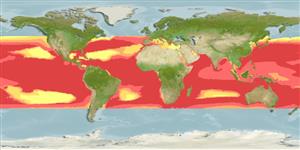Environment: milieu / climate zone / depth range / distribution range
ນິເວດວິທະຍາ
ສັດທະເລ; ນ້ຳກ່ອຍ; ປາທີ່ມີການເຄື່ອນຍ້າຍໃນສະເພາະມາະຫາສະມຸດ (Ref. 51243); ລະດັບຄວາມເລິກ 0 - 85 m (Ref. 13608), usually 5 - 10 m (Ref. 40849). Subtropical; 21°C - 30°C (Ref. 26); 50°N - 40°S, 180°W - 180°E (Ref. 54341)
Atlantic, Indian and Pacific: in tropical and subtropical waters. Highly migratory species
Length at first maturity / ຂະໜາດ / ນ້ຳໜັກ / Age
Maturity: Lm 55.8, range 35 - 93.1 cm
Max length : 210 cm TL ຕົວຜູ້/ບໍ່ມີເພດ; (Ref. 9846); common length : 100.0 cm TL ຕົວຜູ້/ບໍ່ມີເພດ; (Ref. 3390); ນ້ຳໜັກສູງສຸດທີ່ເຄຍຈັດພີມມາ: 40.0 kg (Ref. 30874); ອາຍຸສູງສຸດທີ່ເຄຍລາຍງານມາ: 4 ປີ (Ref. 2885)
ຄີ (ໜາມ)ແຂງຢູ່ຫຼັງປາ (ທັງໝົດ) : 0; ຄີຫຼັງຂອງປາ (ຄີອ່ອນ) (ທັງໝົດ) : 58 - 66; ຄີ(ໜາມ) ແຂງຢູ່ຄີກົ້ນປາ
ກຸ່ມປາກະດູກແຂງ
ຄວາມຖີ່ຂອງກຸ່ມຖ່າຍທອດພັນ
ປາທີ່ມີການເຄື່ອນຍ້າຍຈາກທະເລໄປຫານ້ຳຈືດ ແລະນ້ຳຈືດຫາທະເລ
ປາທີ່ມີການເຄື່ອນຍ້າຍຈາກທະເລແລະໄປໄຂ່ຢູ່ນ້ຳຈືດ
ຄີກົ້ນຂອງປາ
ສັດທີ່ມີກະດູກສັນຫັຼງ
ການຖ່າຍທອດທາງກຳມະພັນຈາກພໍ່ແມ່ຫາລູກ: 0; ຄີກົ້ນຂອງປາ: 25 - 31; ສັດທີ່ມີກະດູກສັນຫຼັງ: 31. This species is distinguished by having the following characters: mature males with prominent bony crest in front of the head; greatest body depth in adults less than 25% of standard length; tooth patch on tongue small and oval; single dorsal fin extending from above eye almost to caudal fin with 58-66 rays; a concave anal fin extending from anus almost to caudal fin; pectoral fin more than half of head length; lateral-line scales at least 200 (Ref. 9648). Colour of body metallic blue-green on the back (fading to grey with green tinge when dead), sides silver with golden sheen, and 1 row of dark spots or golden blotches running below dorsal fin and 1, 2, or more rows on and below lateral line, some scattered irregularly; dorsal and anal fins
black, the latter with a white edge; pectoral fins pale; caudal fin silvery with a golden sheen; in juveniles, only tips of caudal-fin lobes white, pelvic fins black (Ref. 9648).
Adults are found in open waters but also near the coast (Ref. 9293, 11230). Form schools. Feed on almost all forms of fish and zooplankton; also takes crustaceans and squid (Ref. 2850). Sexual maturity is reached in 4-5 months (3 for captive fish) (Ref. 11441). Spawn in the open sea and probably approximate to the coast when water temperature rises (Ref. 9293). Eggs and larvae are pelagic (Ref. 6755). Attracting devices such as floating bundles of bamboo reeds or cork planks are used to concentrate dolphin fish before the nets are set. Marketed frozen (Ref. 9987) and fresh and is of high value (Ref. 9293). Caught by trolling and on tuna longlines; also occasionally with drift nets (Ref. 9846).
In East African waters, spawning season may last from March to early June and spawning occurs inshore. In the western Pacific, sex ratios were about equal during spawning season. Spawning in the western Atlantic occurs over an extended period of time.
Spawn naturally in captivity without artificial inducement (Ref. 41779).
Palko, B.J., G.L. Beardsley and W.J. Richards, 1982. Synopsis of the biological data on dolphin-fishes, Coryphaena hippurus Linnaeus and Coryphaena equiselis Linnaeus. FAO Fish. Synop. (130); NOAA Tech. Rep. NMFS Circ. (443). (Ref. 26)
IUCN Red List Status (Ref. 130435: Version 2024-1)
Threat to humans
Reports of ciguatera poisoning (Ref. 30911)
Human uses
ການປະມົງ: ທີ່ມີການຄ້າສູງ; ການລ້ຽງສັດນ້ຳ: ເປັນສີນຄ້າ; ຊະນິດປາທີ່ຖືກນຳໃຊ້ເຂົ້າໃນການຫາເພື່ອເປັນເກມກິລາ: ແມ່ນ
ເຄື່ອງມື
Special reports
Download XML
ແຫຼ່ງອີນເຕີເນັດ
Estimates based on models
Preferred temperature (Ref.
123201): 18.1 - 29.1, mean 27.4 °C (based on 5894 cells).
Phylogenetic diversity index (Ref.
82804): PD
50 = 1.0000 [Uniqueness, from 0.5 = low to 2.0 = high].
Bayesian length-weight: a=0.01349 (0.01055 - 0.01724), b=2.88 (2.81 - 2.95), in cm total length, based on LWR estimates for this species (Ref.
93245).
ຊັ້ນເຂດຮ້ອນ (Ref.
69278): 4.4 ±0.0 se; based on diet studies.
Generation time: 1.1 (0.7 - 2.7) years. Estimated as median ln(3)/K based on 15
growth studies.
ຄວາມຢືດຢຸ່ນ (Ref.
120179): ສູງ, ປະຊາກອນຕຳ່ສຸດທີ່ໃຊ້ເວລາສອງໜ້ອຍກວ່າ 15 ເດືອນ (K=0.4-1.2; tm<1; tmax=5; Fec=85,000).
Prior r = 1.09, 95% CL = 0.72 - 1.64, Based on 7 data-limited stock assessments.
Fishing Vulnerability (Ref.
59153): Moderate vulnerability (41 of 100).
Climate Vulnerability (Ref.
125649): High to very high vulnerability (70 of 100).
Nutrients (Ref.
124155): Calcium = 61.9 [27.9, 135.3] mg/100g; Iron = 1.59 [0.82, 3.12] mg/100g; Protein = 20.1 [18.8, 21.4] %; Omega3 = 0.237 [0.109, 0.518] g/100g; Selenium = 51.9 [21.7, 122.7] μg/100g; VitaminA = 2.57 [0.64, 11.45] μg/100g; Zinc = 0.54 [0.34, 0.88] mg/100g (wet weight); based on
nutrient studies.
